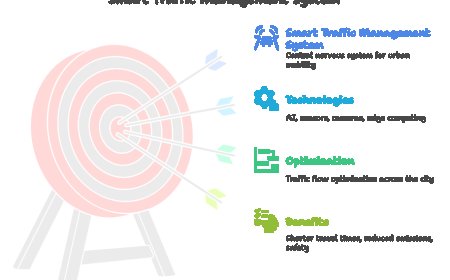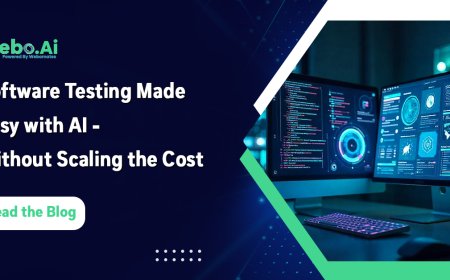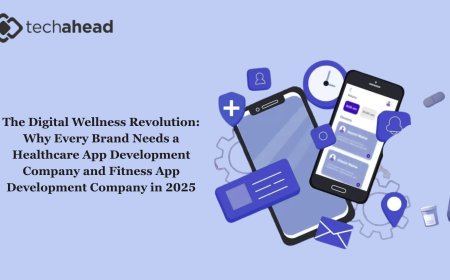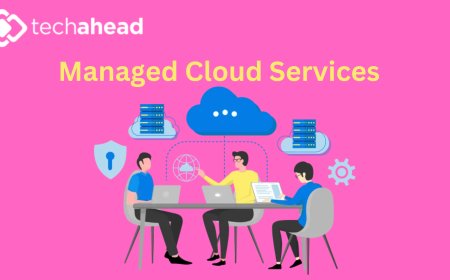Scaling New Heights: How Cloud App Development Companies Power Business Innovation
Discover how cloud app development companies drive business innovation by delivering scalable, flexible, and cost-effective digital solutions for modern enterprises.

In an era defined by digital transformation, businesses are constantly seeking agile, scalable, and cost-effective solutions to meet evolving customer demands. The traditional model of on-premise software development, with its hefty infrastructure investments, rigid deployment cycles, and limited scalability, often falls short. This is where cloud app development companies emerge as indispensable partners, revolutionizing how businesses conceive, build, and deploy their digital assets.
More than just a trend, cloud app development is the new standard, and companies specializing in this domain are the architects of this shift. This blog post will delve into the profound impact of cloud app development, explore the benefits it brings to businesses, shed light on how cloud app development companies operate, and peer into the exciting future of this dynamic field.
The Cloud Imperative: Why Businesses Are Rushing to the Cloud
The move to the cloud isn't just about buzzwords; it's about fundamental business advantages. For enterprises of all sizes, from nascent startups to global conglomerates, cloud application development offers a compelling value proposition:
-
Unmatched Scalability and Elasticity: This is perhaps the most celebrated benefit. Cloud applications are designed to scale seamlessly. Whether your user base suddenly explodes or you experience seasonal peaks, cloud infrastructure can automatically provision or de-provision resources to meet demand. This eliminates the need for expensive upfront hardware investments and ensures your application can always handle its workload, without performance bottlenecks or costly over-provisioning.
-
Significant Cost Savings: The "pay-as-you-go" model of cloud computing is a game-changer. Businesses no longer need to purchase, maintain, and upgrade expensive on-premise servers, networking equipment, and data centers. Cloud providers handle all the infrastructure management, security, and maintenance, translating into reduced capital expenditures (CapEx) and lower operational costs (OpEx). You only pay for the computing power, storage, and services you actually consume.
-
Enhanced Security and Compliance: While some initially harbored security concerns about the cloud, leading cloud providers invest heavily in cutting-edge security measures. They employ sophisticated firewalls, encryption protocols, intrusion detection systems, and dedicated security teams that often surpass the capabilities of in-house IT departments. Furthermore, cloud providers typically adhere to a wide array of industry compliance standards (like GDPR, HIPAA, ISO 27001), helping businesses meet regulatory requirements.
-
Faster Time-to-Market: Cloud development environments, coupled with agile and DevOps methodologies, significantly accelerate the development lifecycle. Tools for continuous integration and continuous delivery (CI/CD) allow developers to automate testing and deployment, pushing out new features and updates rapidly. This agility means businesses can respond quickly to market changes, gather user feedback, and iterate on their applications at an unprecedented pace, gaining a critical competitive edge.
-
Increased Accessibility and Collaboration: Cloud applications are inherently accessible from anywhere with an internet connection, on any device. This fosters remote work, enhances collaboration among distributed teams, and provides employees with the flexibility they need to be productive. For customers, it means seamless access to services and data, regardless of their location or device.
-
Automatic Updates and Maintenance: Cloud service providers manage the underlying infrastructure, including software updates, security patches, and hardware maintenance. This frees up internal IT teams from routine tasks, allowing them to focus on more strategic initiatives and innovation.
-
Innovation and Advanced Services: Cloud platforms offer a vast ecosystem of pre-built services, including artificial intelligence (AI), machine learning (ML), data analytics, IoT services, and more. This allows businesses to easily integrate advanced capabilities into their applications without having to build them from scratch, fostering rapid innovation and creating truly intelligent applications.
The Modus Operandi: How Cloud App Development Companies Deliver Value
Cloud app development companies are not merely coders; they are strategic partners who guide businesses through the complexities of the cloud landscape. Their process typically involves several key phases:
-
Discovery and Strategy: This initial phase is crucial. The cloud development company works closely with the client to understand their business objectives, target audience, existing infrastructure, and specific pain points. They help define the application's vision, scope, features, and the most suitable cloud deployment model (Public, Private, or Hybrid Cloud) and service model (SaaS, PaaS, IaaS). This often involves thorough market research and competitor analysis to identify unique value propositions.
-
Cloud Architecture Design: Based on the discovery phase, expert cloud architects design the application's infrastructure. This involves selecting the optimal cloud platform (AWS, Azure, Google Cloud Platform, etc.), designing a scalable and resilient microservices architecture, planning for data storage and management, and outlining security protocols. They focus on creating a robust, cost-effective, and future-proof foundation.
-
Technology Stack Selection: Cloud development companies advise on the most appropriate programming languages, frameworks, databases, and other tools that align with the project requirements, scalability needs, and budget. Popular choices include Python, Java, Node.js, Ruby on Rails, and various NoSQL and SQL databases offered as cloud services.
-
Development and Integration: This is where the code is written. Leveraging Agile methodologies (Scrum, Kanban), development teams work in iterative sprints, building the application's features. They utilize cloud-native development practices, containerization (Docker, Kubernetes), and serverless computing to ensure efficiency, portability, and scalability. Seamless integration with existing systems and third-party APIs is also a critical part of this phase.
-
Quality Assurance and Testing: Rigorous testing is paramount to ensure the application's performance, security, and functionality. This includes unit testing, integration testing, user acceptance testing (UAT), performance testing (load, stress), and security testing. Cloud environments facilitate comprehensive testing by allowing the creation of isolated test environments that mimic production.
-
Deployment and DevOps: Cloud app development companies employ DevOps principles to automate the deployment process through CI/CD pipelines. This ensures rapid and reliable releases. They also set up robust monitoring and logging systems to track application performance, identify issues, and ensure continuous optimization.
-
Post-Launch Support and Maintenance: The relationship doesn't end at launch. Cloud app development companies provide ongoing support, maintenance, and updates to ensure the application remains secure, performs optimally, and evolves with changing business needs and technological advancements. This includes performance tuning, bug fixes, security updates, and feature enhancements.
The Future is Cloudy: Emerging Trends in Cloud App Development
The cloud landscape is continuously evolving, and cloud app development companies are at the forefront of adopting and driving these innovations:
-
Serverless Computing Everywhere: Serverless (Function-as-a-Service or FaaS) is gaining immense traction. It abstracts away server management entirely, allowing developers to focus solely on writing code for specific functions. This promises even greater cost efficiency, simplified operations, and automatic scaling, becoming ideal for event-driven architectures and microservices.
-
AI and Machine Learning Integration: AI and ML capabilities are becoming deeply embedded into cloud services. Cloud app development will increasingly leverage pre-trained AI models, AI-as-a-Service (AIaaS), and powerful machine learning platforms to build intelligent applications that can analyze data, make predictions, automate tasks, and personalize user experiences.
-
Edge Computing for Real-time Insights: As IoT devices proliferate, the need to process data closer to its source (at the edge of the network) becomes critical for real-time applications. Cloud app development will increasingly incorporate edge computing strategies to reduce latency, improve responsiveness, and enable intelligent operations in scenarios like autonomous vehicles, smart factories, and remote healthcare monitoring.
-
Multi-Cloud and Hybrid Cloud Strategies: Businesses are moving beyond single-cloud dependencies, adopting multi-cloud strategies (using multiple public cloud providers) and hybrid cloud models (combining on-premise infrastructure with public/private clouds). This provides greater flexibility, resilience, cost optimization, and avoids vendor lock-in. Cloud app development companies are crucial in designing and managing these complex distributed environments.
-
Low-Code and No-Code Platforms: To accelerate development and empower "citizen developers," low-code and no-code platforms are gaining traction. These platforms allow users to build applications with minimal or no coding, using visual interfaces and pre-built components. Cloud app development companies can leverage these tools for rapid prototyping and developing less complex applications, freeing up expert developers for more intricate projects.
-
DevSecOps for Inherent Security: Security is no longer an afterthought. DevSecOps integrates security practices throughout the entire development lifecycle, from design to deployment and operations. Cloud app development companies are adopting DevSecOps principles to build inherently secure applications, leveraging automated security testing, vulnerability scanning, and compliance checks.
-
Sustainability in the Cloud: As cloud computing scales, its environmental impact is gaining attention. Future cloud app development will increasingly consider "green cloud computing" principles, focusing on optimizing resource utilization, leveraging energy-efficient architectures, and potentially choosing cloud providers committed to renewable energy sources.
Choosing the Right Cloud App Development Partner in India
India has emerged as a global hub for cloud app development, boasting a vast talent pool of skilled engineers, competitive pricing, and a strong track record of delivering innovative solutions. When selecting a cloud app development company in India, consider the following:
-
Expertise and Experience: Look for a company with a proven track record in your industry or with similar project complexities.
-
Technical Proficiency: Ensure they have deep expertise across various cloud platforms (AWS, Azure, GCP) and relevant technologies.
-
Agile and DevOps Adoption: A company that embraces these methodologies will deliver faster, higher-quality results.
-
Security and Compliance Focus: Verify their commitment to robust security practices and adherence to industry standards.
-
Communication and Collaboration: Choose a partner that offers transparent communication and a collaborative approach.
-
Post-Launch Support: Understand their support and maintenance offerings to ensure long-term success.
Conclusion
Cloud app development companies are more than just service providersthey are pivotal enablers of digital transformation. By harnessing the power of cloud computing, they equip businesses with the agility, scalability, and innovation needed to thrive in today's dynamic market. As the cloud continues its relentless evolution, these specialized firms will remain at the forefront, building the next generation of intelligent, resilient, and transformative applications that redefine how we work, interact, and experience the digital world. The future is undoubtedly in the cloud, and the right development partner can help your business reach new heights.
























